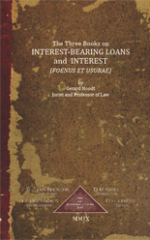The Three Books on interes-bearing loans and interest (Foenus et Usurae) by Gerard Noodt, Jurist and Professor of Law

The Three Books on interes-bearing loans and interest (Foenus et Usurae) by Gerard Noodt, Jurist and Professor of Law
by SJ van Niekerk, JT Pretorius, DM Kriel and DH van Zyl
2009
ISBN: 978-0-9814124-0-5
Pages: 391
Print version: Available
Electronic version: Free PDF available
| File Size: | 7 MB |
| File Type: | application/pdf |
| Hits: | 13373 Hits |